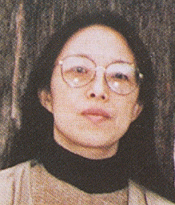Poet
Wang Xiaoni

Wang Xiaoni
(China, 1955)
Biography
Call it a miracle of gravity . . . With simple words and startling images, Wang Xiaoni’s poetry attracts with its weight, calls attention to itself with its substantial themes and concerns, demands to be read for what it can tell us about rapture. And suffering. Although a product of the so-called “obscure” (menglong) generation of poets that emerged in China in the late 1970s, Wang has matured over the past twenty-five years and has attained a rare directness in her work.
A. In writing poetry I hope that the reader will immediately feel the mood and impulse of my originality. This makes many demands on the form of poetry, demands which I think can be summarized in a word: “naturalness”.
B. It is not enough to write poems which are magnificent, graceful or natural on the outside. I think that it is the inner structure of poetry that is the thing to be sought after: the greatest possible concentration of thought and a striving to obtain the broadest possible content.
C. I think good poetry comes with daring to, and being good at, exposing the complex state of the human psyche with skill and relative accuracy. To gloss over or to avoid such things as the relationship between people or the realities of society is negative, insincere and of no possible good.
Among her earliest published works are her “Two Impressions”, made up of the poems “I Felt the Sunlight” and “The Whistling Wind”. Although they seem simple enough, such poems were considerably unusual for their time because they carry no obvious political messages and because they emphasise intense or intimate personal feelings:
—I\'m unaware of the existence of anything else.
There is only me, leaning on sunlight,
still for a full ten seconds.
Sometimes, ten seconds
is longer than a quarter of a century.
(“I Felt the Sunlight”)
Since those initial experiments, Wang Xiaoni has continued to develop her ability to expose “the complex state of the human psyche with skill and relative accuracy”. Unlike other members of the very loosely-affiliated menglong group such as Bei Dao, Yang Lian and Gu Cheng, she has largely avoided linguistic experimentation or language mysticism. In fact she maintains a healthy skepticism about writing signalled back in 1984 with the poem “Poet”:
This morning, together with many others,
I sneered at poetry
for being rubbish.
But only my sneering was genuine
because I am a poet.
In a short preface written for her 1997 collection My Paper Wraps My Fire, her toughness and unpretentious attitude towards the composition of poetry are still very much in evidence:
For the past ten years now, I have rarely looked at magazines or newspapers. If someone happens to send me something, then I read what they send me. These days, my standard for deciding what is good writing is getting more and more simple. I have to see whether the writer is “waddling with words” [zhuaiwen] or “playing” with his readers [wanren]. And I read to see whether he or she has any intention, whether he or she has the wherewithal [dili], to show me anything real. Poetry is by no means the product of profundity or of ideas. The poets of today in particular have to resist the incursions of reason, of trends and fads as if trying to avoid a virus. However, much of what I read is nothing other than viruses that “play” with their readers. An individual is only granted a certain amount of wisdom. Poets should take in everything with their latent individual consciousness. Poets must release themselves with care. I have always argued for poetry’s naturalness and accessibility: to contain a large number of things within the most ordinary language is the basic skill of the poet.
Wang Xiaoni’s suite of thirteen poems entitled On Visiting Friends is a fine example of her work from the 1990s, much of which is organized into sequences. In it, she tackles the subject suffering within the everyday context of serious illness, and with remarkable compression and compassion, salvages a certain courage from trauma and pain.
Poems
{id="1141" title="I Felt the Sunlight"}
{id="1149" title="The Whistling Wind"}
{id="1147" title="Poet"}
{id="1139" title="Full Moon"}
From On Visiting Friends (1992-1993):
{id="1145" title="1. My Retreat"}
{id="1157" title="3. Your Softness Saved You"}
{id="1151" title="4. There Is No Light in This World"}
{id="1153" title="5. What Voice Is That?"}
{id="1143" title="7. I Met with Deception"}
{id="1155" title="12. Your Heaven"}
Publications
Wode shixuan My Selected Poems (poems, 1986)
Fangzhu Shenzhen Exile in Shenzhen (prose, 1994)
Wode zhili baozhe wo de huo My paper wraps my fire (poems, 1997)
Poems
Poems of Wang Xiaoni
Sponsors
























